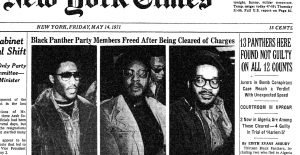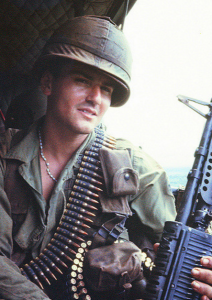Overview
STUDENT COMMENT: This week’s reading in American YAWP covered racial, social, and political tensions, the strain of the Vietnam War abroad and at domestically, the crisis of 1968, and the rise of Richard Nixon. The 1960’s, particularly 1968, is noted as one of the most tragic years in American history and it is not hard to see why. The Tet offensive occurred, which was a series of surprise attacks in Vietnam on the U.S. and South Korean forces, which led to the highest casualty toll of Americans in the Vietnam war. Not only that, but Martin Luther King Jr. and Robert F. Kennedy were assassinated, and through all of this, the support for the Vietnam war continued to dwindle with protests sparking up all across the country leading to the fear that “civil society was unraveling.” (YAWP, 28) Richard Nixon “played on these fears” when he ran for president, also promising that he would end the war, but not win it. (YAWP, 28) Needless, to say, 1968 was a tumultuous year.
STUDENT COMMENT: The oral history projects of Braxton, Huber, and Nolan tell the story of U.S. troops deployed in Vietnam. These three stories help illustrate the danger of the Vietnam war for combat troops as well as some of their reluctance to be stationed there.
Black Panthers
STUDENT COMMENT: In 2015 Christina Braxton wrote about Dennis Braxton, a black veteran who did not receive appreciation after his return from Vietnam, “When he returned to California in 1971, he describes the area as “hippie-land.” Peaceful protests were now extremely common but movements like the Black Panther Party also rose in popularity. One of the first things Braxton did when released from the Navy was to join the Black Panthers”(Braxton, 2015). This goes to show that while Braxton was fighting for the nation there was a public reform, the amount of change that occurred must have been bizarre to him. Braxton did not hesitate to join the Black Panthers, a political group for African Americans, as the civil rights movement was one of key movements going on at the time.
Galiano
STUDENT COMMENT: Huber’s interview with Lawrence Galiano reveals the ways in which the U.S. was unprepared for the war and how the effect of it led to the loss of lives of soldiers and even the vilification that the soldiers received after coming home. The YAWP chapter explains in depth the response of the war on the Johnson presidency and the country’s response to the war, it notably leaves how the soldiers fared under these conditions and their experiences when they came back home. After the war, he was criticized and even asked to take off his uniform on a plane to protect himself. Before the war, Sergeant Galiano was drafted into the war leaving behind his girlfriend and his dream of going to architectural school to fight for his country. This was a decision that was made for him. The whole experience from being drafted to his arrival in Vietnam was littered with inadequate leadership and lack of preparation. Firstly, he was taken to Fort Dix, where he had to sleep in the parking lot because there were no beds. Upon arriving in Vietnam, the soldiers were given little training and their practice with m14 was rendered useless when they were asked to use the m16s. This change seemed more futile when he realized that the communist forces used AK47s, a far more superior weapon that he claims, “didn’t jam [and] you could hold it under water and it would fire.” Additionally, they were wholly unprepared for the war because as thy never had the numbers and military officials did not have insight to provide resources. The YAWP narrates how networks like CBS displayed the violence enacted on the Vietnamese at the hands of the U.S. and this fueled the protest across the country. While the protest against the war is justified, and the violence against the Vietnamese by soldiers like Lt. Calley were truly horrifying, some of the soldiers were just victims of circumstance. The individual stories of Dennis Braxton, who as a black man was belittled and conflicted about the war or Galiano who was blamed for something he could not control, show there is no single narrative in a war. It holds different stakes for all involved.
STUDENT COMMENT: The story that really struck me was the life of Sargent Lawrence Galiano in the Vietnam War. Galiano was drafted in 1966, and was first dropped off in Pleiku, Vietnam with little training or mental preparation. He states, when he was dropped out of the helicopter, “everything was under fire”. I can’t sit here and begin to imagine how horrifying that is, not knowing if you are going to make it out, especially when you are fighting in a war you did not voluntarily sign up for. I also want to point out the aftermath of the war, because I think the mental effects of soldiers are overlooked. Galiano talks about how he struggled mentally after coming home, probably a form of ptsd/depression. My grandfather was also in Vietnam, and he experiences this to this day. In addition to this, the treatment of Vietnam soldiers is something I had really never heard about. Today, our troops are highly respected, whereas back then the veterans were treated horribly because of instances like the “US troops [raping] and/or [massacring] hundreds of civilians in the village of My Lai” (YAWP Chapter 28). I find it really heartbreaking that the American people shamed the Vietnam veterans because their service was not by choice, and not all soldiers participated in these horrifying activities like the instance of My Lai.
Intelligence Operative
STUDENT COMMENT: There are many interesting yet forgotten stories about the soldiers in the Vietnam War. Aside from Dennis Braxton, Jimmy Bracken had the role of gathering social intelligence in Southern Vietnam. He took on ASA missions which he was not even permitted to speak about till long after the end of the war. When reflecting on the war Bracken stated he “didn’t really have that much of an impact”(Nolan, 2018). In the outcome his role may not have been very influential but “As the war deteriorated, the Johnson administration escalated American involvement by deploying hundreds of thousands of troops to prevent the communist takeover of the south. Stalemates, body counts, hazy war aims, and the draft catalyzed an antiwar movement and triggered protests throughout the United States and Europe” (YAWP 28, II). South Vietnam, where Bracken operated the most, was the center of global attention at the time. His role in the war had an effect on foreign policy throughout the world, even if he did not feel it did. The action of the US to have troops in Southern Vietnam outraged the US public. Regardless of the outcome of the war it is tragic that these two veterans did not get to experience the appreciation other veterans received in other wars.



Leave a Reply